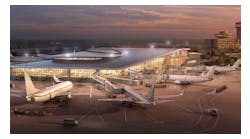The Significant Ways Tech Will Transform 5 Airport Checkpoints in the Coming Years
For most people, the thought of going to the airport for an upcoming trip is usually associated with stress and frustration. Long lines, weather delays, and missed connections are just some of the common anxieties facing everyday travelers. Recently though, technology has started to tilt the landscape in airports’ favor. Airports have seen early positive returns from things like passenger processing and bag-tracking applications, data analytics and integrated system dashboards. This, however, is just the tip of the iceberg.
Further innovation is underway that has the potential to not only help airports optimize passenger dwell time and drive further revenue, but also to simplify their processes, transform their infrastructure and save them money on operational expenses.
Here are just some ways we expect technology to revolutionize five key airport checkpoints within the next 15 years:
- Check In: Currently, many passengers still use airport kiosks or print boarding passes at home, especially in the United States. However, an increasingly mobile generation will lead to everyone arriving to the airport already checked in, and with a digital boarding pass on their mobile device. Additionally, the days of airport kiosks are numbered. In just a few years, more people will be greeted by roving airline/airport staff using mobile devices and/or tablets to help direct passengers.
- Bag Drop: Recently, airports have started exploring ways to improve the bag drop experience. For example, in 2015 Rotterdam The Hague Airport implemented a fast bag-drop application to help boost passenger check-in times. However, most people still print bag tags at airport kiosks or at designated desks. In the coming years, we expect bags to be equipped with RFID chip technology so that travelers and airports can monitor luggage in real-time. Additionally, checked luggage will be able to be dropped off at self-service stations upon arriving at the airport, removing the need to stand in long queues.
- Customs and Border: Thanks to advancements in biometric technology, waiting in lines to pass through international checkpoints will one day be a thing of the past. Solutions involving the art and science of uniquely identifying passengers, be it via facial recognition, fingerprint, or scanning of the eye will make self-identification the norm, with biometric boarding passes confirming travelers’ identities in a secure, prompt fashion.
- Boarding: At most airports, airline staff manually check boarding passes before passengers can board the aircraft. Within the next 10 to 15 years though, innovative solutions deployed at airports will allow travelers to board their flight via a self-service kiosk at the boarding gate.
- Retail: It used to be that airports were dependent on passenger volume or the number of airlines operating within their terminals to generate revenue. In recent years, however, airports have seen non-aeronautical avenues such as duty-free shops and lounges contribute a greater share of revenue. Expect this trend to continue, with airports offering more dwell time options across the dining, retail, and comfort spaces. Additionally, as data analytics become further ingrained, airports will be able to personalize offerings and offer discounts that truly make travelers feel like they’re at home.
As more airports move towards this digital future, it will be key for them to ensure their IT service providers understand and can help them integrate these solutions to create an interconnected, end-to-end passenger ecosystem. This will provide airports with the opportunity to offer more personalized, on-demand information delivered to airport operations and passengers. And ultimately, this will drive even more non-aeronautical revenue for airports.
Olivier Houri serves as vice president and global head of Unisys’ Travel and Transportation Industry business. In this capacity, he is responsible for seeking profitable growth in travel and transportation business solutions and all services that Unisys provides for many prominent companies around the world, spanning the airline, airport, logistics, hospitality and other travel-related sectors. Olivier has developed strong relationships over the years with prominent industry senior executives. An regular participant at aviation industry conferences, he is also an active contributor to many industry business transformation ideas/projects driven today by IATA, the Airport Council International, and regional Airline associations.




